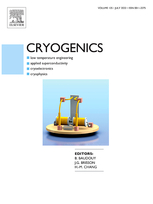
On one selected problem in mathematical modeling of superconducting cylindrical coils in case of using the Ic(B) characteristic linearized in parts.
Author(s) : PITEL J.
Type of article: Article
Summary
The task to design the dimensions of cylindrical superconducting coil, which generates the maximum central field within a constant overall conductor length, represents mathematically the problem to find for a solution of the constrained extremum of a function. This problem can be transformed into the task of solving a non-linear equation because the value of gradient in the position of extremum (maximum) must be zero. The optimization procedure requires inter alia to evaluate the derivative of the Ic(B) characteristic of the conductor concerned. We show that a certain problem may arise if the Ic(B) characteristic is expressed by the function linear in parts. In this particular case, the derivative of the Ic(B) is a discontinuous function consisting of constants. As a consequence, the results of optimization needn’t be correct. The aim of this study is to analyze the nature of the above problem and to propose a way to minimize it. We show that the computational error in determining the dimensions of optimum coil reduces with decreasing a distance between the Ic(B) nodal points. Moreover, the error is completely eliminated if the Ic(B) is expressed in analytical form. This effect is typical for superconducting conductors with a strong non-linearity in Ic(B), such as e.g. MgB2. On the other hand, the effect is not applied in case of e.g. NbTi superconducting conductors, the Ic(B) of which is linear in a broad field range. In this work we only study the case of isotropic Ic(B) characteristic.
Details
- Original title: On one selected problem in mathematical modeling of superconducting cylindrical coils in case of using the Ic(B) characteristic linearized in parts.
- Record ID : 30020962
- Languages: English
- Source: Cryogenics - vol. 81
- Publication date: 2016/11
- DOI: http://dx.doi.org/10.1016/j.cryogenics.2016.11.005
Links
See other articles in this issue (11)
See the source
Indexing
- Themes: Superconduction
- Keywords: Superconducting coil; Optimization; Modelling; Cylinder; Sizing
-
DESIGN OF MAGNETS INSIDE CYLINDRICAL SUPERCONDU...
- Author(s) : RIGBY R. W.
- Date : 1988
- Languages : English
- Source: Rev. sci. Instrum. - vol. 59 - n. 1
View record
-
SELECTED OPTIMISATION METHODS FOR SUPERCONDUCTI...
- Author(s) : KOZAK H.
- Date : 1983
- Languages : Polish
- Source: Pr. Inst. Elektrotech. - n. 124
View record
-
NEW METHOD OF SELECTING THE OPTIMUM GEOMETRICAL...
- Author(s) : CAO X. W.
- Date : 1987
- Languages : English
- Source: Cryogenics - vol. 27 - n. 8
View record
-
Integrated analysis of quench propagation in a ...
- Author(s) : MARINUCCI C., BOTTURA L., CALVI M.
- Date : 2013/01
- Languages : English
- Source: Cryogenics - vol. 53
View record
-
Stability degradation and normal-zone propagati...
- Author(s) : SHIMADA M., ONO M., WACHI Y., HAMAJIMA T., YAMAGUCHI M., ISHIYAMA A.
- Date : 1994
- Languages : Japanese
- Source: Cryogenics/ Cryog. Eng. - vol. 29 - n. 9
View record
